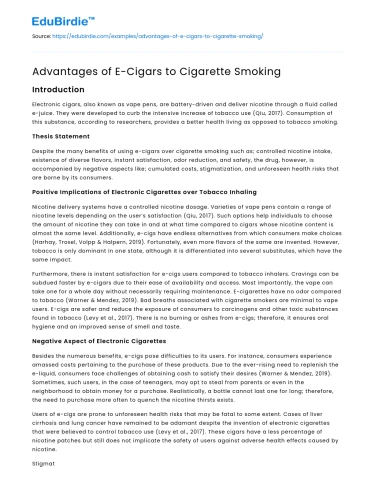Introduction
Electronic cigars, also known as vape pens, are battery-driven and deliver nicotine through a fluid called e-juice. They were developed to curb the intensive increase of tobacco use (Qiu, 2017). Consumption of this substance, according to researchers, provides a better health living as opposed to tobacco smoking.
Thesis Statement
Despite the many benefits of using e-cigars over cigarette smoking such as; controlled nicotine intake, existence of diverse flavors, instant satisfaction, odor reduction, and safety, the drug, however, is accompanied by negative aspects like; cumulated costs, stigmatization, and unforeseen health risks that are borne by its consumers.
Positive Implications of Electronic Cigarettes over Tobacco Inhaling
Nicotine delivery systems have a controlled nicotine dosage. Varieties of vape pens contain a range of nicotine levels depending on the user’s satisfaction (Qiu, 2017). Such options help individuals to choose the amount of nicotine they can take in and at what time compared to cigars whose nicotine content is almost the same level. Additionally, e-cigs have endless alternatives from which consumers make choices (Harhay, Troxel, Volpp & Halpern, 2019). Fortunately, even more flavors of the same are invented. However, tobacco is only dominant in one state, although it is differentiated into several substitutes, which have the same impact.
Furthermore, there is instant satisfaction for e-cigs users compared to tobacco inhalers. Cravings can be subdued faster by e-cigars due to their ease of availability and access. Most importantly, the vape can take one for a whole day without necessarily requiring maintenance. E-cigarettes have no odor compared to tobacco (Warner & Mendez, 2019). Bad breaths associated with cigarette smokers are minimal to vape users. E-cigs are safer and reduce the exposure of consumers to carcinogens and other toxic substances found in tobacco (Levy et al., 2017). There is no burning or ashes from e-cigs; therefore, it ensures oral hygiene and an improved sense of smell and taste.
Negative Aspect of Electronic Cigarettes
Besides the numerous benefits, e-cigs pose difficulties to its users. For instance, consumers experience amassed costs pertaining to the purchase of these products. Due to the ever-rising need to replenish the e-liquid, consumers face challenges of obtaining cash to satisfy their desires (Warner & Mendez, 2019). Sometimes, such users, in the case of teenagers, may opt to steal from parents or even in the neighborhood to obtain money for a purchase. Realistically, a bottle cannot last one for long; therefore, the need to purchase more often to quench the nicotine thirsts exists.
Users of e-cigs are prone to unforeseen health risks that may be fatal to some extent. Cases of liver cirrhosis and lung cancer have remained to be adamant despite the invention of electronic cigarettes that were believed to control tobacco use (Levy et al., 2017). These cigars have a less percentage of nicotine patches but still does not implicate the safety of users against adverse health effects caused by nicotine.
Stigmatization of e-cig users by society is a relative effect of these drugs. The societal perceptions of electronic cigarettes may affect the consumers of the said product (Harhay et al., 2019). Therefore, such people are advised to harm themselves with full knowledge of the product before using to avoid cases of uninformed decisions and choices from them.
Conclusion
As an alternative to reduce tobacco smoking cases, electronic cigarettes have proved to be helpful. They are cheaper, convenient at any quantities, and offer increased satisfaction to users. However, the journey with the e-cigs to the users is not promising in reducing the effects that result from tobacco. Consumers are still prone to health problems; they face stigmatization and racism from society as well as increased costs. The ministry of health should, therefore, come up with better options that will substitute electronic cigarettes but yield the same level of satisfaction.
References
- Harhay, M. O., Troxel, A. B., Volpp, K. G., & Halpern, S. D. (2019). Response to Brown et al. 'Does the offer of e-cigarettes benefit smoking cessation among unselected smokers?”. Addiction (Abingdon, England), 114(1), 187.
- Levy, D. T., Cummings, K. M., Villanti, A. C., Niaura, R., Abrams, D. B., Fong, G. T., & Borland, R. (2017). A framework for evaluating the public health impact of e‐cigarettes and other vaporized nicotine products. Addiction, 112(1), 8-17.
- Warner, K. E., & Mendez, D. (2019). E-cigarettes: comparing the possible risks of increasing smoking initiation with the potential benefits of increasing smoking cessation. Nicotine and Tobacco Research, 21(1), 41-47.
- Qiu, W. H. (2017). U.S. Patent Application No. 15/672,219.






 Stuck on your essay?
Stuck on your essay?

